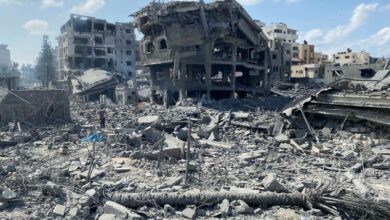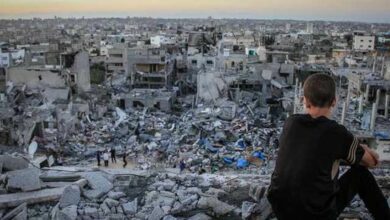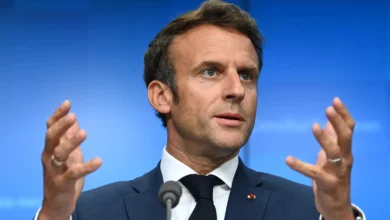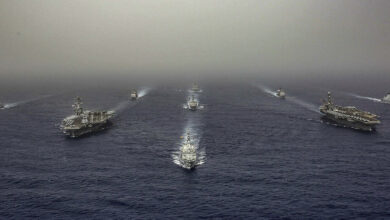Emperor Hadrian shall save the World again
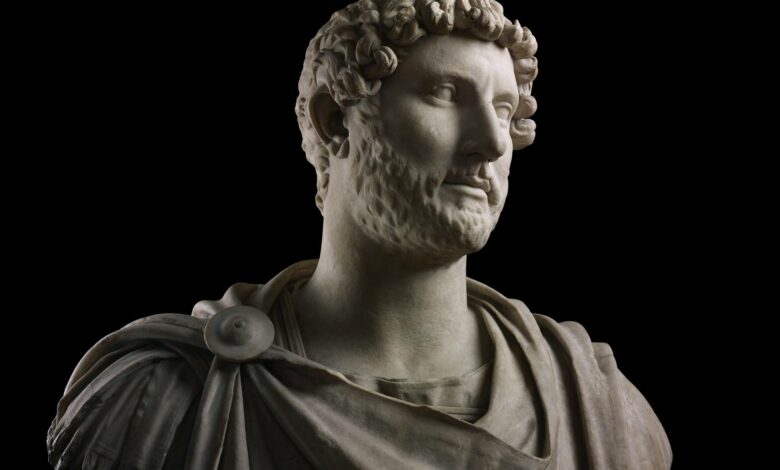
Empires cannot expand forever because the bigger they grow, the less cohesive they become. This was one of the reasons why the expansion of the Roman Empire came to a halt. Aware of the difficulty of managing the affairs of too big an Empire to be ruled, Emperor Hadrian erected the wall in Britain whose remnants are named after him today, to prevent the Empire from further expansion and to deter invasions.
Since the early 1990s, the Liberal world has been incessantly marching on the old worlds in what seemed to its devotees and preachers to be an iconoclastic campaign dictated by providence and led by capital against the old walls. As the empire of capital ceased to deliver the promises it had made, fierce oppositions rose from the rubble of the old worlds to claim back those demolished walls.
Now, 3 empires stand at a tripoint where workers’ democracy, free trade, and conservative values exhaust their capacity for convincing and cannot go any further. On this spot, a wall should be built, but before that, the 3 empires should realise they cannot go any further.
Russia will not accept defeat in Ukraine and might resort to more destructive warfare tactics if it sees it coming. Few months ago, highly classified leaked Pentagon documents revealed the U.S. was pessimistic about Ukraine’s capacity for deterring Russia. The latter’s foreign minister Sergei Lavrov has often warned that the war in Ukraine can escalate into a nuclear third world war.
The West, on the other hand, has invested much in the Ukraine war and will probably do more to avert or delay a Ukrainian defeat. The high-tech weapons that Ukraine has lately been receiving and the experience the Ukrainians have gained from a year-long of warfare are adding to the country’s resilience, which announces a stalemated conflict.
China’s views on Taiwan are more stubborn. The U.S. announcement it will come to Taiwan’s rescue in case the Chinese attack is alarming to international peace and stability. The prospects of a decisive quick victory for one side in this hypothetical war are slim. The prospects of devastation are high not only for the concerned parties but also for the world’s economy. The U.S. and Chinese economies are more interconnected than most people think. They also drive the global economy.
Old-fashioned hegemony is impossible. The West has already realized other superpowers are emerging. This was acknowledged by French President Emmanuel Macron who was seen as the interim leader of the Neoliberal world when President Donald Trump took office in Washington.
Trying to impose hegemony today might be destructive. The power balance, as long as nuclear weapons are in play, does not favour any of the competing parties. Coexistence and multi-polarity might save the world, and for this purpose, walls may have to be rebuilt.
Empires cannot expand forever because the bigger they grow, the less cohesive they become. This was one of the reasons why the expansion of the Roman Empire came to a halt. Aware of the difficulty of managing the affairs of too big an Empire to be ruled, Emperor Hadrian erected the wall in Britain whose remnants are named after him today, to prevent the Empire from further expansion and to deter invasions.
Today the communication revolution has inspired many to think that by becoming a small village the world is easier to rule- a belief that blinded them to foreign and internal challenges of endless expansion and world hegemony. Communication alone does not make power and communication as it is today is far from achieving the dream of connectivity. Technology communicates ideas not understanding, hegemony, or compliance. Messages can travel beyond the borders of the Empire but understanding can run as far as the Empire can stretch. Sometimes technology filters messages allowing only the messages that go with its interests to travel within and outside the borders of the empire. The Church, the temple, the synagogue, and the mosque still hold much significance in an arrogantly secular world that thinks the screen can replace them.
The inevitable walls that will be built in this age will consist in neutral zones separating superpowers. The neutral zones cannot be naively seen as a tool for spreading peace and prosperity. Just as Globalization failed to deliver this promise, walls will perpetuate this failure, but they will at least prevent a direct confrontation between the superpowers.
Niall Ferguson has already declared the outbreak of Cold War II, and in the decades to come, walls will be needed. Walls between neighbours teach respect and protect privacy. The Walls Hadrian built had gates that played the role of today’s customs. As long as walls have doors, they keep the hope of peace alive. They will have to be erected by a new Hadrian in Ukraine and Taiwan and turn them into the Cuba of Cold War II, because otherwise, these places risk becoming the Armageddon of these times. In the rest of the world, curtains, instead of walls, can be negotiated.

